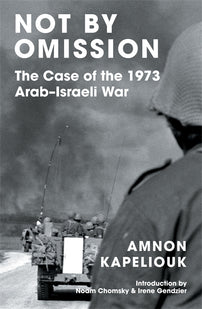Whither Israel?
An extract from Amnon Kapeliouk's Not By Omission.

‘Superman woke up one morning and found that he was an ordinary man’ – thus did a Hebrew author in Jerusalem describe the widespread feeling in Israel since the Yom Kippur War. Indeed, since the war, the people have sensed that their country has returned to its natural dimensions and that it is now more restricted in its actions, in comparison to the ‘glorious’ period that preceded it.
In the period between the two wars, Israel could have taken advantage of the position of strength it had won in June 1967 to come to a decent settlement between itself and its neighbours, but it squandered the rare card that was in its hand. Israel rejected all the proposals that were raised by others, itself refusing to undertake any serious political initiative while devoting all its attention to the obstinate preservation of the results of the Six-Day War. Instead of the status quo changing because of a bold Israeli political initiative, it was eventually broken by Arab military action, which put an end to the protracted political stagnation. Israel, which had acted like a theatre critic, rejecting every peace plan that was put on the stage – as was later admitted, for example, by Israeli foreign minister Abba Eban,[1] could continue to do so no longer. If it did not come up with an initiative of its own, it would have to accept a diktat presented to it by others, who would exact a high political price.
For years, there has been a political debate among politicians and political commentators about the opportunities Israel has missed to break through the wall of hostility between it and the Arabs, in order to come to a peaceful settlement between the two sides. There are those who claim that in the period after the first Israeli–Arab war in 1948, it would not have been difficult to make progress above and beyond the ceasefire agreements with the Arab states, and stronger relations could have been forged with the neighbouring states through an attempt to solve the problem of the Palestinian Arab refugees. However, no serious effort was made in that direction at the time. Israel rested on its laurels after the realization of the old dream of the restoration of Jewish independence in the Land of Israel, and the leaders of the state did not direct their efforts first and foremost to ending the conflict with the Arab world. Another opportunity came in the summer of 1954, when Egypt, the largest and strongest of the Arab states, set out on the path of national independence after the Free Officers’ revolution in July 1952 and was about to sign an agreement for the withdrawal of British forces from the Suez Canal Zone. Instead of welcoming that development and extending a hand of friendship to Egypt, Israel tried to sabotage the British withdrawal from the Suez Canal Zone (the Lavon Affair), because it saw the withdrawal as a danger to its security. Two years later, when Egypt was engaged in an intense political struggle with Britain and France after Nasser’s nation-alization of the Suez Canal in July 1956, Israel exploited the opportunity and joined in the conspiracy with the two declining colonialist powers and attacked Egypt along with them (Operation Sinai-Suez).[2] There might have been an additional opportunity to break the wall five years later, when the Egyptian–Syrian union broke up in September 1961 and Egypt appeared to be trying to shift its focus to internal affairs. Then too, nothing was done.
Those who reject the thesis of missed opportunities claim that every Israeli initiative would have been condemned to failure anyway ‘because of the Arabs’ profound hostility to Israel’. Moreover, even if Israel had accepted initiatives in those cases just mentioned, no substantial result could have been expected, ‘because Israel does not have much to sell’. That last claim has no validity regarding the period after the Six-Day War. In that war, vast expanses of Arab land fell into Israel’s hands, and these could have been used as a serious bargaining chip for the realization of peace. In the period after June 1967 Israel was at the peak of its power and prestige, and if it had proposed bold political initiatives it might have been able to break through the wall surrounding it at long last, to launch a new era in relations with the Arab world and to advance towards peace settlements with the neighbouring states. This applies first and foremost to Egypt and Jordan, whose opposition to Israel’s existence has undergone serious erosion, and even to the Palestinians, whose presence as a political force in the Middle Eastern arena was already beginning to make its mark in the mid 1960s. That golden opportunity to change the nature of Israeli–Arab relations was not exploited. Instead of political initiatives came the fascination with the Territories, along with drunkenness with victory and reliance on the myth of force and the generals’ dreams of Israel as a Great Power somewhere in the continuum between the two super-powers and France and Britain. Moshe Dayan, the man who had more influence than any other leader on the course of events in the period between the third and the fourth rounds, which lasted six years and four months, admitted more than once that it was possible to achieve peace in exchange for the return of the Occupied Territories, but – as he stated – he preferred territory over peace.
The government of Israel was supported in its visionless policy by the Johnson and Nixon administrations. There is no doubt that the status quo which prevailed between the two wars would not have lasted so long without the increasing support of Washington for the policies of Moshe Dayan and Golda Meir. Only after the war did Henry Kissinger permit himself to admit that it had been a mistake for the United States not to pressure Israel to undertake an initiative for a peace settlement.
One of the most important lessons of the Yom Kippur War was that the Israeli–Arab conflict is not likely to be resolved by military means and that the military component of that complex fabric is no longer of supreme importance as in the past. The war in the Middle East became more and more terrible, more and more expensive, without any poten-tial for a decisive conclusion under the international conditions. That was proven decisively in October 1973. But only when the two sides come to a full recognition of the existence of this new reality in our region and together initiate a search for political possibilities to break the tragic circle of recurring wars at ever-shorter intervals – only then will it be possible to say that a most important step has been taken on the way to the ending of this conflict.
At the moment, mutual distrust, anxieties and fears still exist, despite the first hesitant steps that have been taken on the long road to a settlement. The residue of a quarter-century of hostility, blood, tears and destruction cannot disappear quickly. And indeed, alongside those groupings in both camps that are beginning to understand the lesson of the October War – that is, that war under the current condi-tions cannot advance a solution to the conflict – there are players on both sides who have not yet drawn that logical conclusion. On the Arab side there are those who were encouraged by the gains of October and who dream of repeating it ‘more completely’, and on the Israeli side there are still those who believe that only military gains can pave the way to a lasting political settlement on Israel’s terms. In the Israeli camp, a new phenomenon is also discernible, which had been known up to now only on the Arab side: the aspiration of military circles to erase the shame of the war’s first days. In addition, here as there, there are still many who believe and are convinced that justice in this conflict is all on one side.
As a result of the ‘Ramadan War’, the Arab world went from the intolerable situation of ‘no war and no peace’ to a situation of ‘no victory and no defeat’. Any attempt to exaggerate the importance of the Arab achievement in the October War will give the Arab public a distorted view. Algerian president Houari Boumedienne insisted on that point when he said that ‘we must not exaggerate our victories, so that the Arab citizen is not misled as Israel was misled after 1967. We did not defeat Israel, but we defeated fear; and that is one of the most important achievements of the campaign.’[3] The Arabs must adopt a realistic approach, which means recognition of the right of Israel to exist as a sovereign state, as well as an understanding of the psychology of the adversary, the psychology of a persecuted people that lives in fear even when its power has grown and surpassed that of all its enemies. The ‘Masada complex’ the Jewish people carries with it is accompanied in time of danger by the example of Samson who pulled down the pillars of the temple on both himself and on his Philistine enemies. None other than MK Aryeh Eliav, the dove known for tire-lessly seeking a way to a compromise agreement with the Arabs, said after the last war, ‘They will not succeed in uprooting us from here. The whole world will be uprooted along with us.’
As for Israel, the realism that is demanded of it is to recognize that real peace will come only when a compromise settlement is reached between it and the Arab world that surrounds it and only when it stops acting like an appendage grafted onto this region and becomes an organic part of its body. For the sake of a peace settlement with the Arab world, which is the only long-term guarantee of Israel’s survival, it is necessary to mobilize all efforts, to embrace imagination instead of eschewing it, until the objective is attained. But, in order to choose peace, which of course involves big compromises, which are preferable to short-term (and therefore bogus) advantages, Israeli leaders need deep historical insight and broad political horizons. They must under-stand the period they live in and the historical situation they have been given, with its objective limits. That is the necessary condition for the making of wise decisions, so as to avoid repeating the mistakes based on delusions and vain dreams along the lines of the illusions of the period from 1967 to 1973. And the strength to make unpopular decisions is also required. One of Ben-Gurion’s greatest moments was when he gave the order to withdraw from Sinai at the end of the 1956 war. It was only twenty-four hours after he had solemnly declared the birth of the ‘Third Kingdom of Israel’. But Ben-Gurion had the sense to take external pressures into account, to assess the international situation and to understand that he had to order a withdrawal. And, as soon as he had decided, he acted without hesitation.
However, moral sensitivity is no less necessary than political considerations. And this relates above all to the treatment of the problem of the Palestinian Arab people, who have suffered more than any other people from the terrible conflict in the Middle East. To ignore their just rights, their right to an independent state of their own in part of the Land of Israel (which they call ‘Palestine’), alongside the State of Israel, is to leave the wound open. Any attempt to reach a settlement with the Arab states at the expense of the Palestinian people will soon prove to have been a short-term calculation. The prolonged and violent Israeli–Arab conflict has caused many distortions in Israeli life, starting with the channelling of national energy towards military and security matters, all the way up to the corruption of human values, such as inattention and even indifference to the suffering of other peoples. The lack of response in Israel, outside limited left-wing circles, to the horrors of Vietnam, for example, was one saddening sign of that phenomenon. From the Jewish people in Israel, whose fathers had suffered from persecution for generations, some awareness of the sufferings of other peoples might have been expected. All the more so when it comes to the neighbouring people, the Palestinian Arab people, whose tragedy occurred simultaneously with the emergence of the State of the Jews.
The previous wars left the Israelis with exclamation marks. The Yom Kippur War ended with question marks looming on the horizon. After the previous wars, Israelis became more and more prisoners of their victories. This time, in consequence of the ‘unfinished war’, they emerged from that captivity. There are those in Israel who call the Yom Kippur War the ‘war of disillusionment’. That description will be justified only if it turns out that the earthquake of October truly contributed to the elimination of the nationalistic mysticism that reached its peak between the two wars; only if it strengthens realism and hastens the internal social and political recovery which is so crucial to the young state; only if it causes the young people who returned from the fronts to say wholeheartedly: ‘This is a country where it is good to bring children into the world.’
[1] In an interview in Maariv, 28 December 1973.
[2] Also called ‘Operation Kadesh’ in Israel. –Trans.
[3] In an interview in the Cairo periodical Ruz al-Yusuf, 10 December 1973.
[book-strip index="1"]


